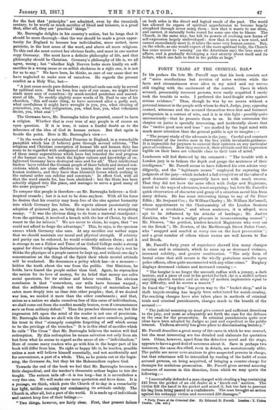FORTY YEARS AT THE CRIMINAL BAR.* Ix his preface the
late Mr. Purcell says that his book consists not of " mere recollections but revision of notes written while the facts and circumstances were alive in my mind and my nerves still tingling with the excitement of the contest. Cases in which accused, presumably innocent persons, were easily acquitted I rarely took the trouble to write. I preferred the hard-fought wins against serious evidence." Thus, though he was by no means without a personal interest in the people with whom he dealt, Judge, jury, opposing counsel, witnesses and tho accused themselves were first and foremost protagonists in a contest. of wits, and it is in this light—possibly quite unconsciously—that ho presents them to us. In this connexion the chapter on juries is specially interesting, and incidentally shows that the " twelve good men and true " are studied by the legal mind with much more attention than the general public is apt to imagine :- " The proper study of the advocate is the jury. Careful and constant observation of the twelve men in the box yields invaluable guidance. It is impossible for jurymen to conceal their opinions on any particular piece of evidence. How they receive it, their attitude and the expression legible on their faces are valuable clues to their turn of mind."
Londoners will feel flattered by the comment : " The trouble with a London jury is to fathom the depth and gauge the acuteness of their intelligence." Mr. Purcell seems to have followed his own advice very diligently, and the " legitimate means " employed for capturing the judgment of the jury—which included a full recognition of the value of a good dramatic situation—apparently have met with much success. That they did not have the same effect with Judge and Magistrate, inured to the ways of advocates, is not surprising ; but here Mr. Purcell's quick observation of character and grasp of a situation saved him from many defeats. He has some interesting things to say of Sir Peter Edlin ; Mr. Serjeant Cox ; Sir William Charley ; Mr. William McConnell, whose • appointment to the Chairmanship of the London Sessions "created a revolution," and whose sentences, it is alleged, were apt to be influenced by his attacks of lumbago ; Mr. Justice Hawkins, who " took a malign pleasure in inconveniencing counsel" ; Mr. Flowers, "the gentlest, kindest-hearted Magistrate who over sat on the Bench "; Mr. Newton, of the Marlborough Street Police Court, who "snapped and snarled at every one on the least provocation " ; and a great number of others whose names are well known to Bar and Bench.
Mr. Purcell's forty years of experience showed him many changes in crime and in criminals, which he sums up as decreased violence, increased subtlety, and greater combination. " The only form of brutal crime that still occurs is the wholly gratuitous assaults upon police officers, often quite unconnected with any other crime." Burglary displays decreased violence and increased cunning :-
" The burglar is no longer the uncouth ruffian with a jemmy, a dark lantern, and a .piece of coal in his pocket for luck ; he is a skilled artisan carrying electric torches and an array of modern implements equal to any difficulty, and he scorns a mascot."
In fraud the " long firm" has given way to the " bucket shop," and in theft bicycle-stealing has largely been substituted for watch-stealing. Far-reaching changes have also taken place in methods of criminal trials and criminal punishments, changes much to the benefit of the accused :- " The judicial summing-up must giro correct and sufficient directions to the jury, and must as adequately set forth the case for the defence as the case for the prosecution. In criminal punishments quite new ideas have been adopted by Judges as just and expedient in the public interest. Uniform severity has given place to discriminating leniency."
Mr. Purcell describes a great many of the cases in which he was counsel, but the most interesting are too detailed and elaborate for quotation here. Crime, however, apart from the detective novel and the stage, appears to have a good deal of sameness about it. Save in perhaps two instances, the cases described, even in details, are monotonously alike. The public are never over-anxious to give suspected persons in charge, but that reluctance will be intensified by reading of the habit of some accused persons, on being acquitted, of bringing a counter-charge for damages for malicious prosecution. Mr. Purcell gives several amusing instances of success in this direction, from which we may quote the following :-
" I successfully defended a man charged with stealing a bag containing £45 from the pocket of an old dealer at a ' knock-out' auction. The victim felt the hand in his pocket and seized it, but too late to prevent his bag from being passed to a confederate. The man brought an action against his unhappy victim and recovered £50 damages."
• Forty Years at the Criminal Bar. By Edmund D. Purcell. Loudon : T. Flakes Cavan. Lea. net.]


























 Previous page
Previous page